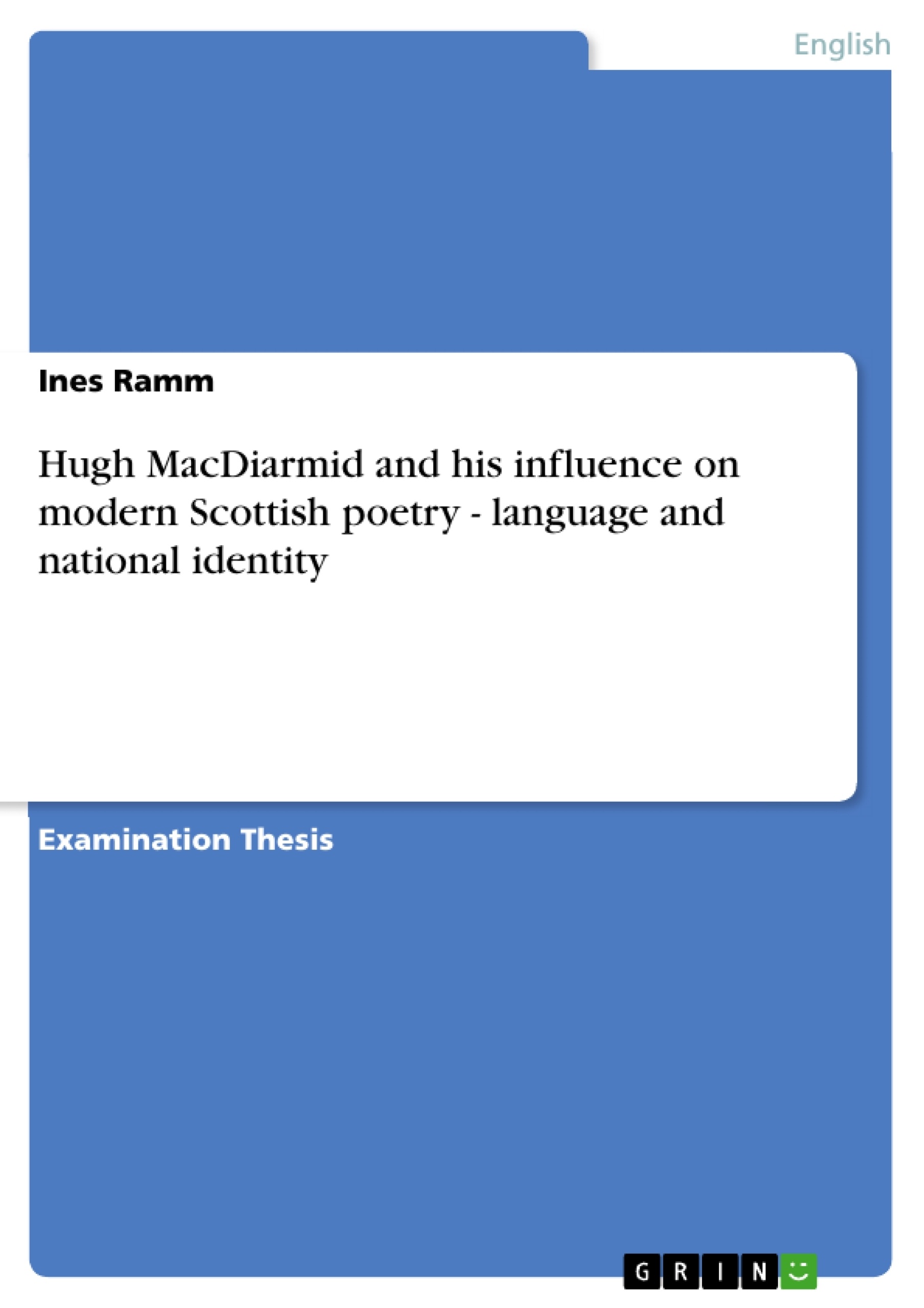
Hugh MacDiarmid and his influence on modern Scottish poetry - language and national identity
Examensarbeit, 2006
75 Seiten, Note: 1,0
Leseprobe
Inhaltsverzeichnis (Table of Contents)
- 1. Introduction
- 2. Hugh MacDiarmid and the Scottish Renaissance
- 2.1 From Christopher Murray Grieve to Hugh MacDiarmid
- 2.2 The concept of national identity
- 2.3 The influence of Modernism
- 2.4 Imaginism and Symbolism
- 2.5 The Liberation of Language
- 3. The Poetry of Hugh MacDiarmid
- 3.1 Annals of the Five Senses
- 3.2 Sangshaw and Penny Wheep
- 3.3 A Drunk Man Looks at the Thistle
- 3.4 Stony Limits and the Period of Synthetic English
- 3.5 In Memoriam James Joyce
- 4. MacDiarmid's Contemporaries
- 4.1 Robert Garioch - Closing the gaps
- 4.2 Norman MacCaig – Distrusting Language
- 5. The 1960s and 1970s
- 5.1 Scottishness after Worl War II
- 5.2 Edwin Morgan – Morganmania
- 5.3 Douglas Dunn - Barbarous Voices
- 6. The 1980s and 1990s
- 6.1 Establishing the Scottish Parliament
- 6.2 Liz Lochhead - The Personal Angle
- 6.3 W.N. Herbert - Outside and Inside
- 6.4 Kathleen Jamie – Recontextualising stereotypes
- 7. Conclusion
Zielsetzung und Themenschwerpunkte (Objectives and Key Themes)
This paper aims to examine the literary effects of Hugh MacDiarmid's writing on contemporary Scottish poetry, exploring both the positive and negative impacts. It delves into the relationship between literature and national identity within the context of the Scottish Renaissance and its evolution. Key questions include the extent to which Scottish identity is realized in modern poetry and the continued relevance of MacDiarmid's conception of national identity in the modern republic. Furthermore, the paper investigates the use of the Scots language following the Renaissance and its function as a medium for national identity.
- The influence of Hugh MacDiarmid on contemporary Scottish poetry
- The interplay between literature and national identity in the Scottish Renaissance and beyond
- The evolution of Scottish identity in modern poetry
- The continued relevance of MacDiarmid's conception of national identity
- The role of the Scots language as a medium for national identity
Zusammenfassung der Kapitel (Chapter Summaries)
Chapter 2 explores the poetic and philosophical principles underlying Hugh MacDiarmid's writing, focusing on his pivotal role in the Scottish Renaissance Movement. It examines his transition from Christopher Murray Grieve to his literary persona, Hugh MacDiarmid, and the influence of Modernism on his work. This chapter serves as a foundation for the detailed analysis of MacDiarmid's poetic development in subsequent chapters.
Chapter 3 analyzes the poetry of Hugh MacDiarmid, focusing on key works that represent the main shifts in his poetic development. The chapter highlights his use of the Scots language and his exploration of national identity through his poems. The analysis of his poetry provides a framework for comparing his lyrical concepts with those of other Scottish poets discussed in later chapters.
Chapter 4 sets the poetic output of selected poets of the twentieth century within the context of Hugh MacDiarmid's work, specifically focusing on the concepts of national identity and the usage of the Vernacular. The chapter highlights the diverse perspectives and approaches of these poets, showcasing the enduring impact of MacDiarmid's legacy on the development of Scottish poetry.
Chapter 5 investigates the evolution of Scottish poetry in the 1960s and 1970s, focusing on the works of Edwin Morgan, Douglas Dunn, and other prominent poets of the era. The chapter explores the influence of social and political changes on the themes and styles of these writers, demonstrating the continued relevance of national identity and the Scots language in their work.
Chapter 6 examines the 1980s and 1990s, analyzing the works of Liz Lochhead, W.N. Herbert, and Kathleen Jamie. The chapter explores the emergence of new voices and perspectives within the Scottish literary landscape, reflecting on the ongoing dialogue between tradition and innovation in contemporary Scottish poetry.
Schlüsselwörter (Keywords)
The main keywords and focus topics of this work include the Scottish Renaissance Movement, Hugh MacDiarmid, national identity, Scots language, contemporary Scottish poetry, Modernism, and Vernacular. The paper explores the complexities of these themes, examining how they intersect and influence the development of Scottish literature.
Details
- Titel
- Hugh MacDiarmid and his influence on modern Scottish poetry - language and national identity
- Hochschule
- Carl von Ossietzky Universität Oldenburg
- Note
- 1,0
- Autor
- Ines Ramm (Autor:in)
- Erscheinungsjahr
- 2006
- Seiten
- 75
- Katalognummer
- V65637
- ISBN (eBook)
- 9783638581547
- ISBN (Buch)
- 9783656802129
- Dateigröße
- 781 KB
- Sprache
- Englisch
- Schlagworte
- Hugh MacDiarmid Scottish
- Produktsicherheit
- GRIN Publishing GmbH
- Preis (Ebook)
- US$ 31,99
- Arbeit zitieren
- Ines Ramm (Autor:in), 2006, Hugh MacDiarmid and his influence on modern Scottish poetry - language and national identity , München, Page::Imprint:: GRINVerlagOHG, https://www.diplomarbeiten24.de/document/65637
- Autor werden
- Ihre Optionen
- Vertriebskanäle
- Premium Services
- Autorenprofil
- Textarten und Formate
- Services für Verlage, Hochschulen, Unternehmen

- © GRIN Publishing GmbH.
- Alle Inhalte urheberrechtlich geschützt. Kopieren und verbreiten untersagt.
- info@grin.com
- AGB
- Open Publishing
Der GRIN Verlag hat sich seit 1998 auf die Veröffentlichung akademischer eBooks und Bücher spezialisiert. Der GRIN Verlag steht damit als erstes Unternehmen für User Generated Quality Content. Die Verlagsseiten GRIN.com, Hausarbeiten.de und Diplomarbeiten24 bieten für Hochschullehrer, Absolventen und Studenten die ideale Plattform, wissenschaftliche Texte wie Hausarbeiten, Referate, Bachelorarbeiten, Masterarbeiten, Diplomarbeiten, Dissertationen und wissenschaftliche Aufsätze einem breiten Publikum zu präsentieren.
Kostenfreie Veröffentlichung: Hausarbeit, Bachelorarbeit, Diplomarbeit, Dissertation, Masterarbeit, Interpretation oder Referat jetzt veröffentlichen!
- GRIN Verlag GmbH
-
- Nymphenburger Str. 86
- 80636
- Munich, Deutschland
- +49 89-550559-0
- +49 89-550559-10
- info@grin.com
-









